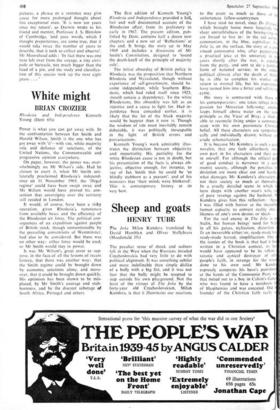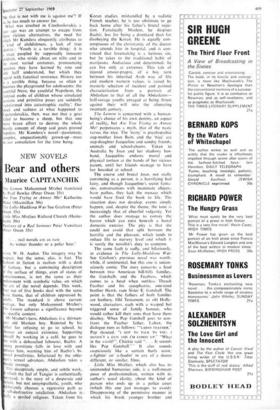Sheep and goats
HENRY TUBE
The Joke Milan Kundera translated by David Hamblyn and Oliver Stallybrass (Macdonald 35s) The peculiar sense of shock and sadness felt in the West when the Russians invaded Czechoslovakia had very little to do with political alignment. It was something subtler and more indefinable than simple dislike of a bully with a big fist, and it was not fear that the bully might be tempted to step outside his own playground. Not the least of the virtues of The Joke by the forty-year old Czechoslovakian, Milan Kundera, is that it illuminates our reactions to the event as much as those of hi unfortunate fellow-countrymen.
I have read no novel, since Dr Zhive;;0 which brought home more forcefully th, sheer untruthfulness of the boxing-ring are forced to live in: in the red corner communism, in the blue, capitalism. Ti;. Joke is, on the surface, the story of a con vinced communist who, after perpetratin a practical joke at his university in th, years shortly after the war, is expel! from the party, and sent to do a punith form of national service; in the milde political climate after the death of Stalin he is able to complete his studies a return to normal life, but his expellene have turned him into a bitter and self-hario cynic.
His story is contrasted with those o his contemporaries: one takes refuge in hi passion for Moravian folk-song; anothe keeps himself above water on the sa principle as the Vicar of Bray; a third able to reconcile living under a communi state with his own passionate Christi belief. All these characters are sympathe cally and individually drawn, without an crude schematisation.
It is because Mr Kundera is such a go novelist, that one feels effortlessly one own part in his characters and their pa in oneself. For although the official pa of good conduct is narrower in a co munist society, although the penalties f deviation are more clear cut and harsher what damages Mr Kundera's characters not their society so much as themselv In a cruelly detailed scene in which hero sleeps with another man's wife, of pure revenge against the husband, N Kundera gives him this reflection: 'Aga I was filled with horror at the incredib human capacity to convert reality into likeness of one's own desires or ideals ..
For the real enemy in The Joke is n Stalin, but human beings' need for Sia in all his guises, stylisation, distortion fit an inexorable either/or, ready-made lo‘ ready-made hatred, simplification. One the ironies of the book is that had it he written in a Christian context, its h: would have appeared to be its villain satanic and cynical destroyer of of people's faith, in revenge for the done to his own soul. Mr Kunde expressly compares his hero's punishine at the hands of the Communist Party ‘■ that meted out to a boy in Calvin's Gene, who was found to have a notebook ' of blasphemies and was executed. Did founder of the Christian faith realh 'He that is not with me is against me'? If so, he has much to answer for. What was crushed in Czechoslovakia a sear ago was an attempt to escape from these vicious alternatives, the need for ahich Mr Kundera eloquently attributes to a kind of childishness, a lack of true identity: 'Youth is a terrible thing: it is a stage peopled by supposedly innocent children, who stride about on stilts and in the most varied costumes, pronouncing speeches they have learned by rote and only half understand, but which they regard with fanatical reverence. History too is a terrible thing, because so often it becomes the playground for adolescents: the outhful Nero, the youthful Napoleon, the frenzied mobs of children whose simulated passions and primitive poses are suddenly transformed into catastrophic reality'. Our shock and sadness at what happened to Czechoslovakia, then, was .not that a goat failed to become a sheep, but that one more brave effort to destroy the whole astly concept of sheep and goats proved hopeless. Mr Kundera's novel—passionate, complex, unquestionably grown-up—must be our consolation for the time being.







































 Previous page
Previous page